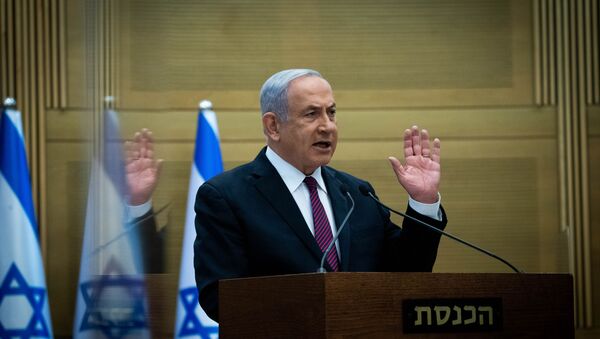The upcoming fourth round of Israeli elections set for 23 March will differ from the past three times Israel went to the polls.
Just like before, the main issue will be whether the Israeli public supports or rejects Prime Minister Benjamin Netanyahu but unlike previously, the battle in March will be even more ruthless, rough, and ugly.
Trial That Split the Country
The reason is not only that this time around Netanyahu will need to elbow opponents from the left and the right, something that might force him to alter his rhetoric, but also that in 2021 he will need to face the resumption of his trial, where he will be asked to attend hearings, present evidence, and face a series of witnesses against him.
That trial, where he faces charges including buying positive press and receiving illegal gifts from a rich donor, has already split Israeli society, forming two large camps. One would like to see Netanyahu remain in power, despite the allegations against him. The other wants him to leave his post.
Images of protesters gathering in front of his official residence in Jerusalem are nothing new. They have been circulating since last March, when the first mass demonstrations against him erupted. But there are also those who continue to support him and who will make sure to cast their ballot for him on the appointed day.

In fact, a recent poll found that 38 percent of Israelis still see him as the most suitable candidate, as opposed to the head of the conservative party Yamina, Naftali Bennett, and alternate prime minister Benny Gantz, who gained 17 and 9 percent of votes respectively.
Support for the PM might grow as Israel nears election day but it might also vanish, depending on how well Netanyahu copes with other factors that will top this election agenda.
In Netanyahu We Trust?
One such aspect will certainly be the handling of the pandemic. Netanyahu's government is being held responsible for the dire economic crisis that COVID-19 has evoked.
The country's deficit now stands at more than 11 percent, the absolute highest since the mid-1980s. Hundreds of thousands in Israel are still jobless, tens of thousands of small and medium sized businesses remain closed, and officials are struggling to put forward a coherent plan on how to resolve the situation.
But the mass vaccination campaign is proving to be effective. As of Tuesday, Israel has vaccinated around 20 percent of its population and if things go according to plan, by the end of March, when elections are due to take place, most of the country's citizens will already be inoculated, the Jewish state and its economy will start getting back on track and will be something that might play into the hands of Netanyahu.

Security will also play a role in the nation's decision about whether to stick with Netanyahu or to replace him with another candidate.
Many Israelis still consider Iran enemy number one, a country that wants to annihilate the Jewish state. They are concerned that the incoming US administration will move forward with a nuclear deal with Tehran, something many in the country claim will embolden the Islamic Republic and its allies, including Hedzbollah.
With such "threats" around, Israelis might want to stick with Netanyahu, branded by some as Mr Security rather than opt for less experienced candidates who still need to prove themselves.
By 2019, he had built more residential units than any other prime minister, giving a green light to nearly 20,000 homes, 70 percent of which are located in "isolated" settlements or areas surrounded by Palestinian towns.
Jewish settlers might not want to exchange that bond they have with Netanyahu for a new candidate, even one from the right flank of the Israeli political spectrum.
As election day gets closer, Netanyahu will surely step up efforts to secure their votes as well as those of others. He will also accelerate his accusations against his rivals, just as was the case in previous rounds. But his opponents will not sit idly by.
On Monday, it was reported that Gantz had urged the heads of other centre and left-wing parties to join forces to topple Netanyahu.
The only question that begs to be answered is whether they will be able to put their egos aside and find enough common ground to achieve their aims.



